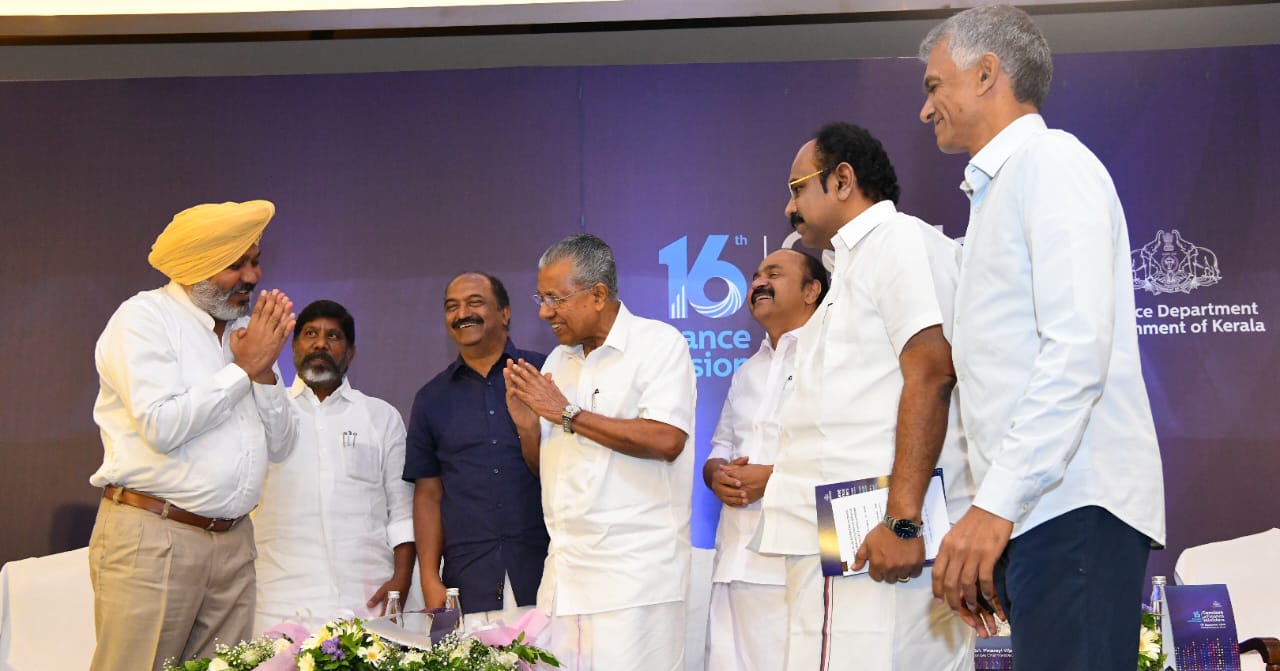Published Sep 13, 2024 | 12:05 AM ⚊ Updated Sep 13, 2024 | 9:14 AM

Conclave of Finance Ministers in Kerala
In a crucial bid to address the growing fiscal imbalances between the Union and states, Kerala on Thursday, 12 September hosted a high-profile conclave involving finance ministers, secretaries, and renowned economists from Tamil Nadu, Karnataka, Telangana, and Punjab.
Convened at the Hyatt Regency, Thiruvananthapuram, the event marked a significant effort to formulate a collective approach in presenting the states’ case to the 16th Finance Commission, constituted under Dr Arvind Panagariya in December 2023.
The commission’s recommendations will play a pivotal role in shaping the distribution of taxes and grants between the Union and states for the coming years.
Chief Minister Pinarayi Vijayan, while delivering the keynote address, underscored the conclave’s importance in navigating the complexities of India’s federal fiscal structure. Reflecting on the successful outcome of a similar conclave seven years ago ahead of the 15th Finance Commission, he highlighted the crucial role played by the states in reshaping the Terms of Reference (ToR).
“This time, the ToR of the 16th Finance Commission is confined to what is mandated under Article 280 of the Constitution, which was a demand made by Kerala,” he stated, adding that the commission should not be restricted by an overly broad ToR, ensuring the autonomy of its recommendations.
One of the key issues discussed was the rising share of surcharges and cesses collected by the Union government, which now account for about 20 percent of the gross tax revenue but remain outside the divisible pool of taxes shared with states. This trend, the Chief Minister pointed out, has significantly reduced the states’ share in the divisible pool.
Kerala, which had demanded a higher share of 50 percent in the previous commission, reiterated the need to address this “vertical fiscal imbalance” between the Union’s revenue collection and states’ expenditure obligations.
The CM in his speech also made the case of higher share of taxes collected by the Union for the states.
“The demand for a higher share for the States in the taxes collected by the Union is having continued relevance and it is my request to the eminent scholars and colleagues who are here to formulate this in a concrete manner. This will help the States to make an effective case before the 16th Finance Commission for raising the share of taxes which are distributed to the States, in view of the widening Vertical Fiscal Imbalances,” he said.
Finance Minister KN Balagopal amplified these concerns, stressing that fiscal federalism in India is facing its “worst phase” due to unprecedented fiscal squeeze on the states. He cited the growing centralization of fiscal power, with Union policies such as the abolition of the Planning Commission, the introduction of GST, and off-budget borrowings systematically depriving states of their fiscal autonomy.
He also raised the issue of declining unconditional grants from the Finance Commission, which have plummeted from 31.2% in 2009-10 to just 17.4 percent in 2023-24, leaving states more dependent on conditional grants.
“The conclave is a continuation of the steps Kerala has been taking to bring national attention to this issue. Almost all states are now facing the same fiscal challenges, regardless of their political leadership,” said Balagopal, adding that the conclave aims to push for a more equitable distribution of resources, empowering the states to fulfill their constitutional obligations, especially in sectors like health and education.
Among the notable subjects the conclave discussed was the issue of horizontal devolution, which has historically disadvantaged states like Kerala. With Kerala’s share in the divisible pool of taxes dropping from 3.05 percent in the 11th Finance Commission to just 1.92 percent in the 15th, the state has been penalised for its higher per capita income and population control efforts, Balagopal alleged.
“Although the states are provided with 41% of the total divisible pool, what actually the states receive is only around 30% due to the rising share of cess and surcharges,” Balagopal pointed out.
He also commented that, the fiscal federal relations in the country are being transformed from “cooperative federalism” to “subordinated federalism” or “coercive federalism”.
The conclave called for a more nuanced approach, urging the 16th Finance Commission to consider factors like population density and infrastructure costs, rather than solely relying on income and area-based criteria.
Experts attending the conclave also stressed the need for states to receive funds without conditionalities, ensuring they have the flexibility to implement development programs suited to their unique needs.
The Chief Minister expressed optimism that the conclave’s deliberations would provide meaningful inputs to strengthen the cooperative federal framework, a concept under threat in the current political climate. The event, which saw participation from key representatives of southern and northern states, signals a growing consensus among states to challenge the shrinking fiscal space available to them.
As the 16th Finance Commission begins its deliberations, this conclave is expected to have far-reaching implications for the future of Centre-State fiscal relations, potentially reshaping the dynamics of India’s federal polity.
The conclave concluded with a call to formulate concrete proposals for submission to the Finance Commission, with the hope that it would restore the balance of fiscal power and bolster India’s unique model of unity in diversity.
In a time of evolving fiscal challenges and shifting economic priorities, the Conclave is expected to serve as a powerful platform for States with shared development objectives to voice their interests and collaboratively shape the nation’s financial landscape.
(Edited by Neena)

